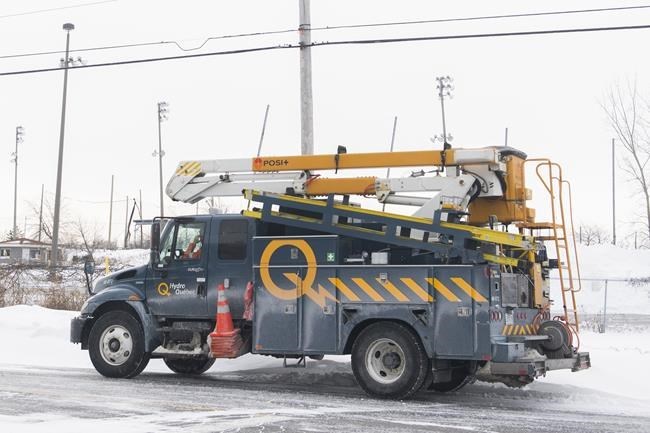MONTREAL — Lengthy power outages that have left some Quebecers in the dark for days have exposed the province's lack of preparedness for the green energy transition to come, an expert said Wednesday.
The province needs to improve its infrastructure and emergency planning, as Quebec society increasingly replaces fossil fuels with electricity to reach emissions targets, Normand Mousseau, scientific director of the Institut de l’énergie Trottier at Polytechnique Montréal, said in an interview.
On Wednesday afternoon, more than 11,800 Hydro-Québec customers were still without power about five days after a winter storm slammed Eastern Canada — down from nearly 20,000 that morning. The Quebec City region had the most clients without power, followed by Côte-Nord and Saguenay-Lac-St-Jean.
The lengthy outage "shows to what point we remain fragile and we aren't prepared," he said. Mousseau, who is also a physics professor at UniversitĂ© de MontrĂ©al, added that the impact of outages will only worsen as the province's reliance on electricity grows.Â
"People were going into their cars to warm up during the night or for a few hours, but when we'll all have electric cars we won't be able to do that," he said.Â
Mousseau said Hydro-Québec should consider a program to gradually bury more of its power lines when it makes sense to do so. The province should also develop a "real plan for resilience" that could include installing powerful batteries in certain areas to maintain some electricity when power lines go down, he said.
An auditor general's report in December found that Hydro-QuĂ©bec's service has become less reliable and that the provincial Crown corporation isn't fully equipped to handle the challenges associated with an aging grid. The report found that the average length of outages increased 63 per cent between 2012 and 2021, when major weather events were excluded.Â
An $800-million plan launched in 2020 to reduce the number of service interruptions has been only partially carried out, the report found.
Hydro-Québec CEO Sophie Brochu told reporters on Monday that it was extreme weather — not weaknesses in the grid — that caused hundreds of thousands of Quebecers to lose power after the storm that began in the province Dec. 23.
"Put any equipment in front of 120-kilometre winds and we'd be exactly in the same situation," she said.Â
The utility, Brochu added, has also launched a program to catch up on years of under-maintenance of the infrastructure, including to cut trees and other vegetation near transmission lines.Â
Hydro-Québec has promised that the vast majority of customers would have their power restored by the end of Wednesday, but it has also said it couldn't provide an end date for all the outages.
One Quebec resident who has spent days in the dark said he has “completely lost confidence” in Hydro-QuĂ©bec’s services after losing electricity twice since the storm. Yves St-Laurent said the power first went out Dec. 23 at the home he shares with his wife and three children in Stoneham-et-Tewkesbury, about a 35-minute drive north of Quebec City. It was briefly restored on Christmas, only to go out for another 36 hours.Â
“I have been living here for 12 years, and every time there is a storm and wind, whether it is winter or summer, we always lose electricity," St-Laurent said in an interview Wednesday, adding that he feels that the utility has failed to maintain its infrastructure.Â
François Bouffard, a professor at McGill University’s department of electrical and computer engineering, said restoring power after the current storm is a “logistics” problem for Hydro-Québec, which, like many sectors of Quebec's economy, is lacking skilled staff. That problem was likely compounded by the holidays and the fact that neighbouring jurisdictions, which normally would have dispatched workers to help Quebec, were hit as well.
He said Quebec has more overhead power lines than other provinces, such as Ontario, adding that many transmission lines are in places that are difficult to access, lengthening the time to restore power.
If you want to have resilience, "you need to bury,” Bouffard said. But he pointed out that putting lines underground is expensive and the cost would be borne mostly by taxpayers and municipalities.
Mousseau said Hydro-Québec has long cited costs as an excuse to resist burying power lines. A long-term plan could include burying lines when streets are open for road work, he added.
However, he said the government lacks general mitigation and crisis management strategies that would protect citizens during outages, adding that Hydro-Québec can't be blamed for the province's failures.
As an example, he said, better land-use planning could reduce urban sprawl and ensure power infrastructure is easier for crews to reach; as well, he said, the Public Security Department could develop a more detailed plan to get people emergency power and heat.
He said it's up to municipalities, the province and Hydro-QuĂ©bec to get together and develop a real strategy to ensure Quebecers aren't left in the dark and cold.Â
This report by The Canadian Press was first published Dec. 28, 2022.
— With files from Marisela Amador.
Morgan Lowrie, The Canadian Press



